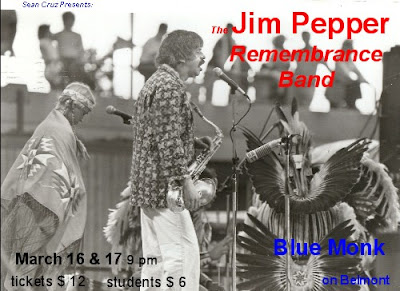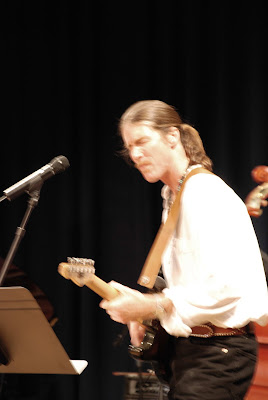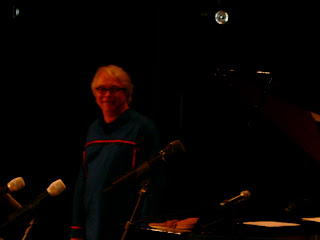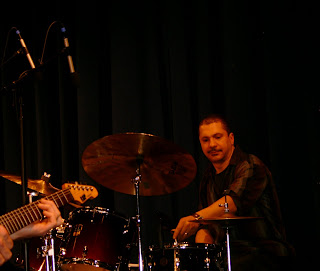Tune in to KBOO at 6:00 p.m. this Saturday for an hour of the late, great Native American saxophone player Jim Pepper on Jazz Rap 2, hosted by Gene the Jazz Machine.
I will be Gene the Jazz Machine’s guest, playing some rare Pepper sides, and discussing the forthcoming 1st annual Jim Pepper Festival of the Arts, to be held in Portland.
Connect to KBOO for live streaming audio here: http://www.kboo.fm/listen
---Sean Cruz
Thursday, December 20, 2007
Sunday, August 26, 2007
Saturday, August 25, 2007
Saturday, May 05, 2007
The Pepper Family's Gifts to the National Museum of the American Indian
Chief among the gifts dedicated to the Smithsonian National Museum of the American Indian by the family of Jim Pepper:
Jim's late-1950's vintage silver-plated Selmer balanced-action saxophone.
With this instrument, with his unique voice, with that rattle, wearing that embroidered hat, with the eagle feather attached, Jim Pepper bridged cultures and continents, paving the way for future generations of musicians.
Tuesday, April 17, 2007
Yellowhammer performed at NMAI Tribute to Jim Pepper



Four members of Yellowhammer, the internationally renowned Oklahoma drum group, performed at the Jim Pepper tribute, leading off the concert with honor songs.
More than two decades ago, these musicians toured and performed with Jim Pepper.
Yellowhammer also performed their award-winning traditional and contemporary Southern Plains songs at the National Museum of the American Indian's Cherry Blossom Social Dance the following afternoon.
Sunday, April 15, 2007
Saturday, April 14, 2007
A Tribute to Jim Pepper at National Museum
Wednesday, April 11, 2007
Jim Pepper honored by Smithsonian, National Museum of the American Indian
Oregon-born Native American musician Jim Pepper (1941-1992) was honored with a series of events at the National Museum of the American Indian, Smithsonian Institution culminating with performances by the Jim Pepper Remembrance Band and Yellowhammer.
Among the items donated to the Museum by the family of Jim Pepper was his silver-plated saxophone.
The Museum also featured the award-winning documentary "Pepper's Powwow" in its cinema, two shows a day for several weeks preceding the April 7 concert.
Photographs of the concert and ceremony are being prepared for posting, will be up soon.
At the request of the Pepper family, I made the following remarks during the ceremony:
Remarks for the Jim Pepper Dedication
National Museum of the American Indian
Smithsonian Institution, Washington, D.C.
by Sean Cruz, on behalf of the family of Jim Pepper
April 7, 2007
“You must not forget me when I’m long gone, for I loved you so dearly,” Jim Pepper sang (in his song ‘Remembrance’), and we are gathered here today to proclaim that this unique and remarkable man will indeed never be forgotten.
On behalf of the family of Jim Pepper, Hung-a-che-eda, the Flying Eagle, I am honored and privileged to speak today, and I hope that my words are worthy of the occasion, that they carry honor and respect to all.
Jim Pepper was born in 1941, and he passed from this life in 1992, leaving a legacy of art and personality that bridged cultures and continents.
The gifts with which the Pepper family honors the National Museum of the American Indian today, including the silver saxophone through which Jim spoke his heart, always honoring his Indian heritage, forging new directions in music, preparing the way for future generations of musicians, are emblems of that legacy.
In order to understand the legacy of Jim Pepper, one must first appreciate that Jim’s music originated in the traditions, the language and the culture of Native People, in his absorption of the teachings of his grandfather Ralph Pepper, and of his father Gilbert Pepper and his mother Floy Pepper.
Their influences are at the core of this glorious, transcendental music.
Those teachings inspired Jim throughout his entire life, and we are all the beneficiaries of those lessons.
As a dancer, a singer, a composer, a bandleader, an innovator and as a saxophone player, Jim took those traditional songs, chants, rhythms, sounds—never losing contact with their Native origins, never failing to give honor to his People—and created a new vocabulary of sound and meaning, incorporating American jazz, African and Caribbean rhythms, melody and what he liked to call “sweet har-mo-ny” into a body of work that has yet to be fully appreciated.
The music often categorized as “world music” was to Jim Pepper, simply, “music for the People.”
In 1999, in her acceptance speech on the occasion of her son’s First Americans in the Arts award, Floy Pepper spoke these words:
“Jim Pepper was a member of the Kaw Indian Nation, known as the Wind People, from his father. From me, his mother, he was a member of the Creek Indian Nation, known as the People of the Waters.
“It is no wonder his music was so strong and powerful—with the wind to carry his music to the four directions of the earth—and as long as the grass shall grow and the waters flow—which is forever—may his spirit remain alive for time immemorial.”
Assembled here today, from the East, the West, the North and the South, the musicians and singers of the Jim Pepper Remembrance Band and Yellowhammer have come to pay tribute to their musical and spiritual brother, and the tears they shed this afternoon—like the tears that flowed during yesterday’s rehearsal—mark the depth and the breadth of the love they share for this wonderful soul, the man who Muskogee Creek poet Joy Harjo called “The Musician Who Became a Bear”, in her song dedicated to Pepper that is already in the Smithsonian collection.
We do more than remember Jim today; we celebrate him.
In the month that Jim passed, that February of 1992, Caren Knight-Pepper composed a song-poem titled simply, “Jim.”
That poem begins:
“Family Jim
Our son Jim
Brother Jim
Uncle Jim
My Jim
Your Jim
All of ours Jim…”
And the poem concludes:
“B-flat Jim
Alaska Jim
Powwow Jim
Polar Bear Jim
Feather Jim
Gourd rattle Jim
Gentle Jim
“Witchi-Tai-To Jim
Water spirit Jim
Comin’ and Goin’ Jim
Ya-na-ho Jim
Ya-na-ho
“Ya-na-ho”
Jim Pepper, son of the Creek and Kaw Nations, son of Oregon and the United States, son of Gilbert and Floy Pepper, has become a son for the ages.
--Sean Cruz
The family of Jim Pepper donated to the Museum:
[] Jim’s silver-plated Selmer balanced-action saxophone, vintage late 1950s
National Museum of the American Indian
Smithsonian Institution, Washington, D.C.
by Sean Cruz, on behalf of the family of Jim Pepper
April 7, 2007
“You must not forget me when I’m long gone, for I loved you so dearly,” Jim Pepper sang (in his song ‘Remembrance’), and we are gathered here today to proclaim that this unique and remarkable man will indeed never be forgotten.
On behalf of the family of Jim Pepper, Hung-a-che-eda, the Flying Eagle, I am honored and privileged to speak today, and I hope that my words are worthy of the occasion, that they carry honor and respect to all.
Jim Pepper was born in 1941, and he passed from this life in 1992, leaving a legacy of art and personality that bridged cultures and continents.
The gifts with which the Pepper family honors the National Museum of the American Indian today, including the silver saxophone through which Jim spoke his heart, always honoring his Indian heritage, forging new directions in music, preparing the way for future generations of musicians, are emblems of that legacy.
In order to understand the legacy of Jim Pepper, one must first appreciate that Jim’s music originated in the traditions, the language and the culture of Native People, in his absorption of the teachings of his grandfather Ralph Pepper, and of his father Gilbert Pepper and his mother Floy Pepper.
Their influences are at the core of this glorious, transcendental music.
Those teachings inspired Jim throughout his entire life, and we are all the beneficiaries of those lessons.
As a dancer, a singer, a composer, a bandleader, an innovator and as a saxophone player, Jim took those traditional songs, chants, rhythms, sounds—never losing contact with their Native origins, never failing to give honor to his People—and created a new vocabulary of sound and meaning, incorporating American jazz, African and Caribbean rhythms, melody and what he liked to call “sweet har-mo-ny” into a body of work that has yet to be fully appreciated.
The music often categorized as “world music” was to Jim Pepper, simply, “music for the People.”
In 1999, in her acceptance speech on the occasion of her son’s First Americans in the Arts award, Floy Pepper spoke these words:
“Jim Pepper was a member of the Kaw Indian Nation, known as the Wind People, from his father. From me, his mother, he was a member of the Creek Indian Nation, known as the People of the Waters.
“It is no wonder his music was so strong and powerful—with the wind to carry his music to the four directions of the earth—and as long as the grass shall grow and the waters flow—which is forever—may his spirit remain alive for time immemorial.”
Assembled here today, from the East, the West, the North and the South, the musicians and singers of the Jim Pepper Remembrance Band and Yellowhammer have come to pay tribute to their musical and spiritual brother, and the tears they shed this afternoon—like the tears that flowed during yesterday’s rehearsal—mark the depth and the breadth of the love they share for this wonderful soul, the man who Muskogee Creek poet Joy Harjo called “The Musician Who Became a Bear”, in her song dedicated to Pepper that is already in the Smithsonian collection.
We do more than remember Jim today; we celebrate him.
In the month that Jim passed, that February of 1992, Caren Knight-Pepper composed a song-poem titled simply, “Jim.”
That poem begins:
“Family Jim
Our son Jim
Brother Jim
Uncle Jim
My Jim
Your Jim
All of ours Jim…”
And the poem concludes:
“B-flat Jim
Alaska Jim
Powwow Jim
Polar Bear Jim
Feather Jim
Gourd rattle Jim
Gentle Jim
“Witchi-Tai-To Jim
Water spirit Jim
Comin’ and Goin’ Jim
Ya-na-ho Jim
Ya-na-ho
“Ya-na-ho”
Jim Pepper, son of the Creek and Kaw Nations, son of Oregon and the United States, son of Gilbert and Floy Pepper, has become a son for the ages.
--Sean Cruz
The family of Jim Pepper donated to the Museum:
[] Jim’s silver-plated Selmer balanced-action saxophone, vintage late 1950s
[] Both of Jim's saxophone cases
[] Beaded ball cap worn by Jim Pepper in concert, with feather, “Jim” embroidered
[] Turtle-shell rattle used in concert and the recording studio
[] Original hand-written scores and sheet music, including “Witchi-Tai-To”
[] Original LPs, including Jim Pepper’s 1971 “Pepper’s Powwow”
[] Beaded ball cap worn by Jim Pepper in concert, with feather, “Jim” embroidered
[] Turtle-shell rattle used in concert and the recording studio
[] Original hand-written scores and sheet music, including “Witchi-Tai-To”
[] Original LPs, including Jim Pepper’s 1971 “Pepper’s Powwow”
Saturday, March 24, 2007
Jim Pepper Remembrance Band performed at the Blue Monk March 16 & 17
The Jim Pepper Remembrance Band:
Caren Knight-Pepper, vocals and percussion
Gordon Lee, piano and vocals
Glen Moore, bass
JB Butler, guitar
Carlton Jackson, drums, vocals
Next performance:
National Museum of the American Indian
Smithsonian Institute
Washington, DC
April 7th Two performances
On the occasion of the dedication of Jim Pepper's saxophone to the National Museum of the American Indian's permanent collection.
Sunday, March 11, 2007
Jim Pepper Remembrance Band returning to Portland

The Jim Pepper Remembrance Band returns to the Blue Monk on SE Belmont in Portland for two nights only, Friday and Saturday, March 16 & 17.
Tickets are $ 12 general admission or $ 6 with student ID
Next Remembrance Band performances:
April 7, 2007
National Museum of the American Indian (NMAI), Smithsonian Institution, Washington, D.C.
(On the occasion of the dedication of Jim Pepper's saxophone to the NMAI collection.)
Sunday, January 21, 2007
Subscribe to:
Posts (Atom)






























